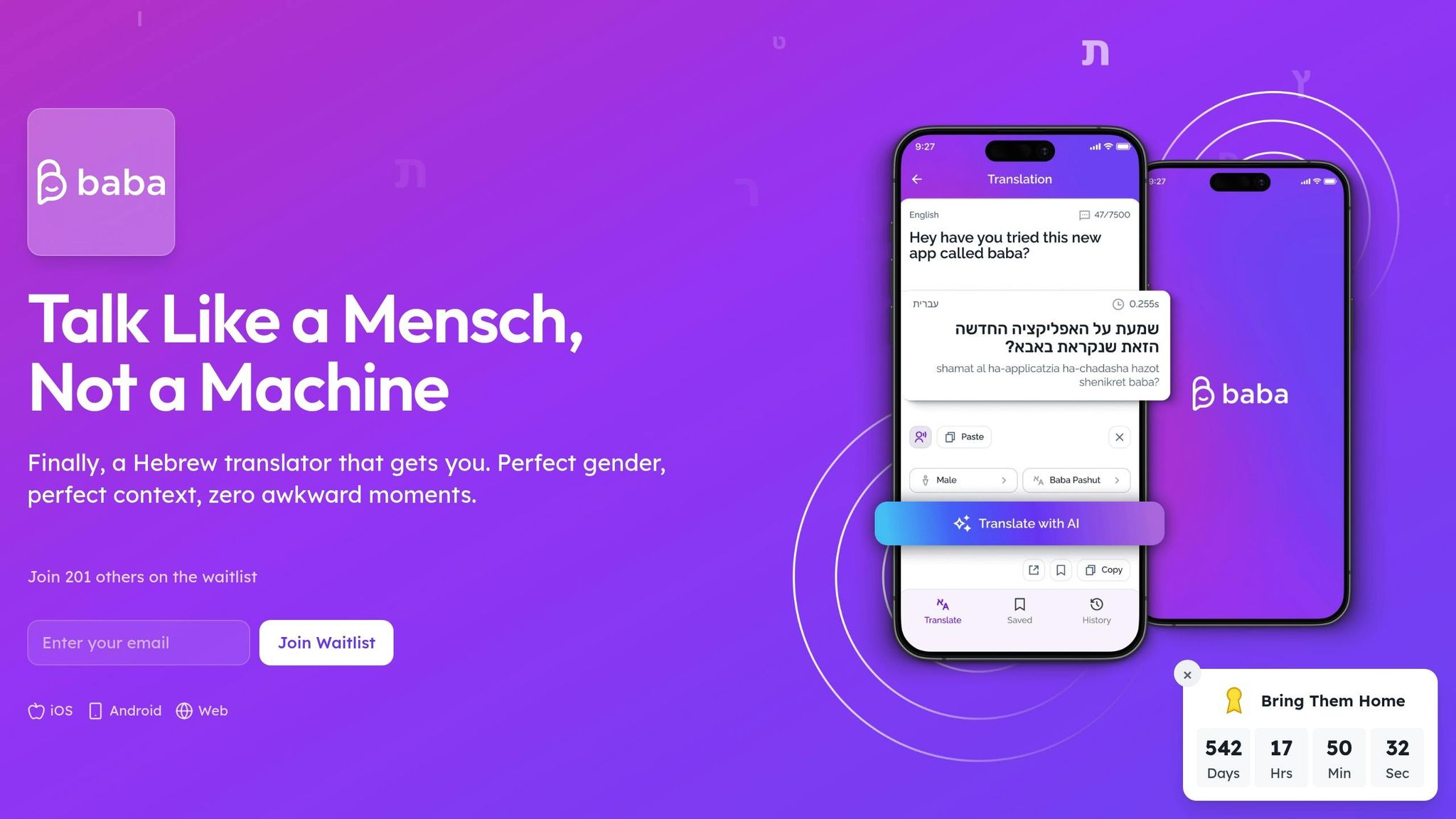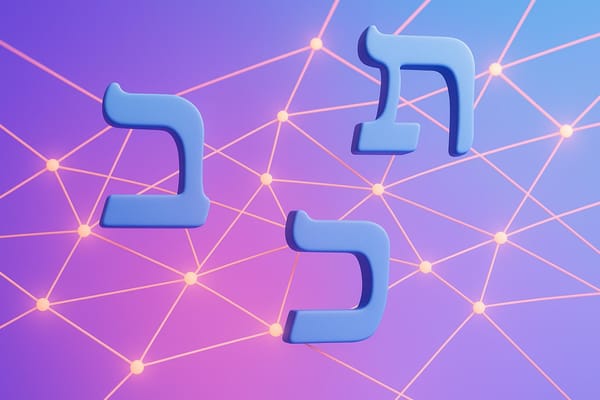Ultimate Guide to Conversational Hebrew for Travelers
Enhance your Israel trip by mastering essential Hebrew phrases, navigating etiquette, and connecting with locals through language.

Planning a trip to Israel? Even though many Israelis speak English, learning basic Hebrew can make your experience smoother and more enjoyable. Here's why:
- Connect with locals: Simple phrases like "Shalom" (Hello) or "Toda" (Thank you) show effort and can spark friendly interactions.
- Navigate easily: Understand street signs, bus routes, and menus in Hebrew.
- Order food confidently: Tackle local restaurants and markets without hesitation.
- Handle emergencies: Essential phrases can be lifesavers.
Quick Tips:
- Hebrew reads right to left.
- Words often skip written vowels.
- Politeness matters: Start with "Slicha" (Excuse me) when asking for help.
Learn greetings, navigation phrases, and restaurant terms to make your trip stress-free. Practice daily and use tools like the baba app for real-time translation and pronunciation help. Sign up at www.itsbaba.com to get started!
Hebrew for Travelers: Essential Phrases for Your Israel Trip
Must-Know Hebrew Phrases
Learn these handy Hebrew phrases to navigate everyday travel situations with ease.
Basic Greetings
Start off on the right foot with these useful greetings:
| Hebrew | Pronunciation | English | Notes |
|---|---|---|---|
| שלום | sha-LOM | Hello/Goodbye | A universal greeting |
| בוקר טוב | BO-ker tov | Good morning | Used until around noon |
| ערב טוב | E-rev tov | Good evening | Used after sunset |
| תודה | to-DA | Thank you | Add רבה (ra-BA) for "thank you very much" |
| סליחה | sli-CHA | Excuse me/Sorry | Great for getting attention or apologizing |
| מה שלומך | ma shlo-MECH (f) / ma shlo-MHA (m) | How are you? | Adjust based on the person’s gender |
Now, let's move on to phrases that will help you find your way.
Navigation Phrases
- איפה...? (EY-fo) – "Where is…?"
- לאן...? (le-AN) – "To where…?"
- ישר (ya-SHAR) – "Straight ahead"
- ימינה (ya-MI-na) – "Right"
- שמאלה (SMO-la) – "Left"
- כמה זה עולה? (ka-MA ze o-LE) – "How much does it cost?"
When asking for directions, it’s polite to start with סליחה (sli-CHA).
Restaurant Hebrew
Dining out? These phrases will come in handy:
| Situation | Hebrew | Pronunciation | English |
|---|---|---|---|
| Ordering | אני רוצה | a-NI ro-TSE | I want |
| Asking for a menu | תפריט בבקשה | taf-RIT be-va-ka-SHA | Menu, please |
| Dietary needs | אני צמחוני/ת | a-NI tzim-cho-NI/NIT | I'm vegetarian |
| Asking for the bill | חשבון בבקשה | chesh-BON be-va-ka-SHA | Check, please |
| Water | מים | MA-yim | Water |
| Without | בלי | bli | Without |
Before eating, say בתיאבון (be-te-a-VON) to wish everyone a good meal. These phrases will make your dining experience smoother and more enjoyable.
Want more? Join the waitlist for our mobile app at www.itsbaba.com.
Hebrew Pronunciation Guide
Once you've learned some basic phrases, improving your pronunciation takes your Hebrew skills to the next level. Clear pronunciation helps you connect and communicate more effectively. Let’s break it down.
Hebrew Letters and Sounds
The Hebrew alphabet has 22 letters and is read from right to left. Each letter represents a consonant sound. Here are a few key examples:
| Letter | Name | Sound | Example |
|---|---|---|---|
| א | Alef | Silent | אבא (a-BA) - father |
| ב | Bet | B/V | בוקר (BO-ker) - morning |
| ל | Lamed | L | לילה (LAI-la) - night |
| מ | Mem | M | מים (MA-yim) - water |
| ר | Resh | R | רחוב (re-CHOV) - street |
Hebrew vowels are shown as dots or lines placed around the letters. In modern Hebrew, these markings are often left out, and readers rely on context to figure out the vowel sounds.
Now, let’s look at some sounds that might be tricky for beginners.
Tricky Sounds in Hebrew
Here are a few sounds that can be challenging for English speakers:
Guttural Sounds
- ח (chet): Similar to the "ch" in Bach.
- ע (ayin): A deeper sound from the throat.
- ר (resh): A rolled R, similar to the French R.
Stress and Emphasis
Hebrew typically emphasizes the final syllable of a word. For example, sha-LOM (peace).
Understanding these nuances will help you sound more natural when speaking Hebrew.
Speaking Practice
Here’s how to practice:
- Start with short, simple words like שָׁלוֹם (sha-LOM). Gradually move on to longer ones like לְהִתְרָאוֹת (le-hit-ra-OT).
- Practice distinguishing similar sounds, such as כ/ח (khet/khaf) and ב/ו (bet/vet).
- Listen to native speakers and imitate their intonation and rhythm.
Ready to refine your Hebrew pronunciation even further? Join the waitlist for our mobile app at www.itsbaba.com to access interactive exercises and get real-time feedback!
Hebrew Communication Tips
Understanding Hebrew etiquette can make social interactions in Israel much smoother. Beyond learning basic phrases and pronunciation, knowing the cultural norms can greatly improve your communication.
Greeting Etiquette
Greetings in Hebrew depend on the time of day and the level of formality:
| Time of Day | Casual Greeting | Formal Greeting |
|---|---|---|
| Morning (until ~12 PM) | בוקר טוב (Boker tov) | בוקר טוב אדוני/גברתי (Boker tov adoni/gvirti) |
| Afternoon (~12 PM - 5 PM) | צהריים טובים (Tzohorayim tovim) | צהריים טובים אדוני/גברתי (Tzohorayim tovim adoni/gvirti) |
| Evening (after 5 PM) | ערב טוב (Erev tov) | ערב טוב אדוני/גברתי (Erev tov adoni/gvirti) |
In formal situations, address people using titles and last names during first meetings. In casual interactions, first names are common. Younger Israelis often keep it simple with "היי" (Hi) or "שלום" (Shalom).
Non-Verbal Communication
Body language plays a big role in Israeli culture. Here are some key points to keep in mind:
- Hand gestures: Israelis often use hand movements while speaking. A palm-up gesture signals openness and friendliness.
- Personal space: A typical comfortable distance is around 2 feet (60 cm).
- Eye contact: Maintaining direct eye contact shows respect and attentiveness. Avoiding it might give the impression of disinterest.
- Physical contact: Light touches on the arm or shoulder are common, even among people who have just met.
Conversation Guidelines
To ensure respectful and engaging conversations, follow these tips:
- Be direct: Israelis value straightforward communication. Ask clear questions and express your thoughts openly.
- Speaking style: Conversations are often lively, with louder tones reflecting enthusiasm and passion.
- Interruptions: In informal settings, interruptions can show interest and involvement.
Topics to avoid or approach cautiously:
- Politics and religion (unless invited to discuss)
- Military service (a sensitive subject for many)
- Regional conflicts
- Personal financial matters
Safe and engaging topics:
- Israeli cuisine and food culture
- Travel tips and local destinations
- Technology and innovation
- Family life and hobbies
- Israeli music, films, and entertainment
Want to learn more? Join the waitlist for our mobile app at www.itsbaba.com to explore interactive scenarios and deepen your understanding of Hebrew culture.
Hebrew Learning Tools
If you're planning to travel, these tools can help you pick up Hebrew quickly and effectively.
baba - Smart Hebrew Translation

baba uses AI to tackle the complexities of Hebrew, like gender and context:
- Gender-sensitive translations for culturally accurate communication
- Context-aware understanding to suit different social settings
- Real-time assistance for smoother, more natural conversations
Sign up for the waitlist at www.itsbaba.com to access the mobile app.
To take your learning further, practice regularly with native speakers.
Practice Partners
Sharpen your Hebrew by connecting with locals through:
- Language exchange meetups
- University language programs
- Community centers (matnas'im)
Pair this practice with Hebrew media for a deeper dive.
Hebrew Media Resources
Improve your skills by engaging with Hebrew-language content:
- TV Shows: Kan 11 News
- Podcasts: Hebrew Pod 101
- Music: Spotify's "Israeli Top 50"
- YouTube Channels: Kan Educational
Tip: Start with content that includes Hebrew subtitles. It’s a great way to link spoken words to their written form.
These tools and resources can help you feel more confident and prepared for your time in Israel. Sign up for baba's app waitlist at www.itsbaba.com.
Conclusion: Speaking Hebrew in Israel
Travel Tips Review
Learning Hebrew adds depth to your time in Israel. Here are some key tips to keep in mind as you navigate the country: Greet people with 'Shalom' during the day and 'Layla tov' in the evening, use 'Bevakasha' (please) and 'Toda' (thank you) to show politeness, and speak with confidence even if you make mistakes. Also, pay attention to Hebrew's gender-specific rules, adjusting your words based on who you're speaking to.
These small efforts can make a big difference in connecting with locals and immersing yourself in the culture.
Next Steps
- Spend 15–20 minutes practicing Hebrew daily
- Watch Hebrew shows or listen to Israeli music with subtitles
- Attend Hebrew language meetups while in Israel
- Try baba's AI for real-time, gender-specific translations
- Use baba's real-time support to refine your skills
Want more help? Join the waitlist for our mobile app at www.itsbaba.com.





